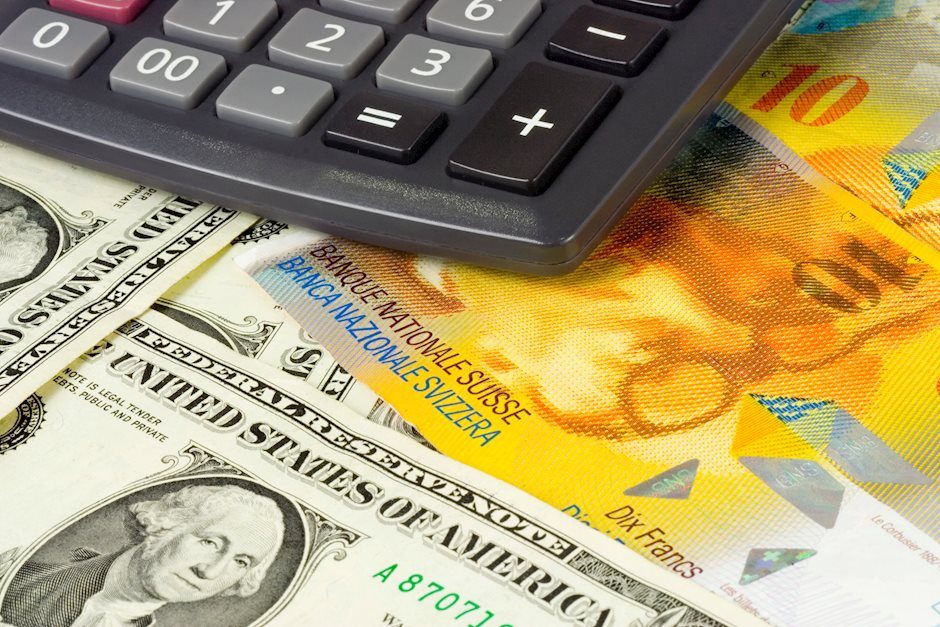USD/CHF finds temporary support above 0.8500 ahead of Fed minutes
- USD/CHF finds a temporary cushion near 0.8520 with investors focusing on the FOMC minutes.
- Market sentiment seems quiet with FOMC minutes in focus.
- Fed Powell may not provide a preset rate cut path in his speech at the Jackson Hole Symposium.

The USD/CHF pair discovers an interim support near 0.8520 in Wednesday’s European session after a three-day losing streak. The Swiss Franc asset finds cushion as the US Dollar (USD) edges higher after posting a fresh seven-month low. The US Dollar Index (DXY), which tracks the Greenback’s value against six major currencies, rises slightly to near 101.50 from 101.31.
Market sentiment remains quiet, with investors focusing on the Federal Open Market Committee (FOMC) minutes for the July policy meeting, which will be published at 18:00 GMT. S&P 500 futures have posted any gains in the European session. 10-year US Treasury yields remain subdued near 3.81%.
Investors will look for fresh cues about how much the Federal Reserve (Fed) will cut interest rates in September and by the year-end. In the July policy meeting, the Fed left interest rates unchanged in the range of 5.25%-5.50% but opened doors for rate cuts in September.
This week, the Jackson Hole Symposium will be the crucial event for the US Dollar as Fed Chair Jerome Powell will provide fresh interest rate guidance. Fed Powell might refrain from committing a pre-defined rate-cut path but is expected to highlight that risks have now emerged in both aspects of the dual mandate (inflation and employment).
Meanwhile, the Swiss currency will be guided by market speculation for the Swiss National Bank’s (SNB) interest rate path this year amid an absence of top-tier economic events. Currently, financial markets expect that the SNB could cut interest rates again in September as price pressures continue to abate.
Swiss Franc FAQs
The Swiss Franc (CHF) is Switzerland’s official currency. It is among the top ten most traded currencies globally, reaching volumes that well exceed the size of the Swiss economy. Its value is determined by the broad market sentiment, the country’s economic health or action taken by the Swiss National Bank (SNB), among other factors. Between 2011 and 2015, the Swiss Franc was pegged to the Euro (EUR). The peg was abruptly removed, resulting in a more than 20% increase in the Franc’s value, causing a turmoil in markets. Even though the peg isn’t in force anymore, CHF fortunes tend to be highly correlated with the Euro ones due to the high dependency of the Swiss economy on the neighboring Eurozone.
The Swiss Franc (CHF) is considered a safe-haven asset, or a currency that investors tend to buy in times of market stress. This is due to the perceived status of Switzerland in the world: a stable economy, a strong export sector, big central bank reserves or a longstanding political stance towards neutrality in global conflicts make the country’s currency a good choice for investors fleeing from risks. Turbulent times are likely to strengthen CHF value against other currencies that are seen as more risky to invest in.
The Swiss National Bank (SNB) meets four times a year – once every quarter, less than other major central banks – to decide on monetary policy. The bank aims for an annual inflation rate of less than 2%. When inflation is above target or forecasted to be above target in the foreseeable future, the bank will attempt to tame price growth by raising its policy rate. Higher interest rates are generally positive for the Swiss Franc (CHF) as they lead to higher yields, making the country a more attractive place for investors. On the contrary, lower interest rates tend to weaken CHF.
Macroeconomic data releases in Switzerland are key to assessing the state of the economy and can impact the Swiss Franc’s (CHF) valuation. The Swiss economy is broadly stable, but any sudden change in economic growth, inflation, current account or the central bank’s currency reserves have the potential to trigger moves in CHF. Generally, high economic growth, low unemployment and high confidence are good for CHF. Conversely, if economic data points to weakening momentum, CHF is likely to depreciate.
As a small and open economy, Switzerland is heavily dependent on the health of the neighboring Eurozone economies. The broader European Union is Switzerland’s main economic partner and a key political ally, so macroeconomic and monetary policy stability in the Eurozone is essential for Switzerland and, thus, for the Swiss Franc (CHF). With such dependency, some models suggest that the correlation between the fortunes of the Euro (EUR) and the CHF is more than 90%, or close to perfect.
Author

Sagar Dua
FXStreet
Sagar Dua is associated with the financial markets from his college days. Along with pursuing post-graduation in Commerce in 2014, he started his markets training with chart analysis.

















